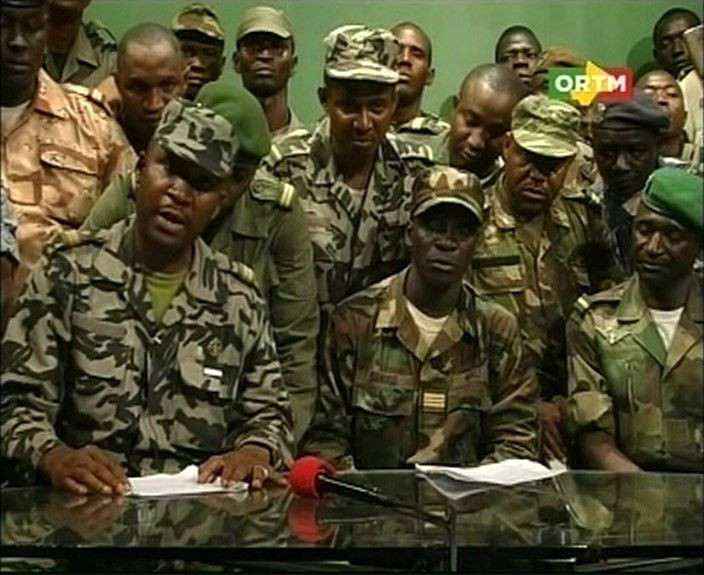Tuareg Rebels Advance In Northern Mali Amid Military Coup

Tuareg rebels in northern Mali, flush with arms and fighters from the Libyan revolution, pushed south Thursday night to occupy positions vacated by government forces as mutinous soldiers in the capital sought to complete a coup by arresting the president, military sources said.
The MNLA (Azawad National Liberation Movement) rebels were approaching towns in the Sahara desert north, taking advantage of the confusion created by a coup attempt in the distant capital, Bamako, by low-ranking soldiers angry at the government's handling of the uprising, Reuters reported.
By late Wednesday, the mutinous soldiers had overrun the presidential palace, were in control of state television and roamed the streets of Bamako. But President Amadou Toumani Toure's whereabouts were still unconfirmed, officials said.
Mali, which was flooded with men and weapons after Libya's civil war, was already in crises -- with the Tuareg-led rebellion, a growing Islamist threat and a food shortage -- well before the soldiers mutinied.
A Malian officer in the northern town of Kidal told Reuters rebels had occupied the military camp in Anefis, 100 km (60 miles) to the southwest, after government forces withdrew.
The army has pulled back to Gao, a source in Timbuktu, another main town in the north, told Reuters, asking not to be named. There is no longer any military leadership. (The rebels) will take the towns in the north.
The MNLA rebels, whose numbers have been swollen by Malian Tuareg returning from the ranks of Moammar Gadhafi's former Libya's army, have been fighting since mid-January for an independent north. They have pushed government soldiers out of remote towns but had not yet threatened the regional capitals of Kidal, Timbuktu and Gao.
The MNLA has been accused by Toure's government of collaborating with al Qaeda in the Islamic Maghreb and regional drug traffickers, Bloomberg BusinessWeek reports.
Tens of thousands of people have fled their homes, moving to other areas of Mali and to neighboring countries including Burkina Faso, Mauritania and Niger to escape the violence between the MNLA and the army and in fear of reprisal attacks, according to the International Red Cross. Their plight is worsening a food-security crisis that threatens 15 million people in seven countries, according to the United Nations Food and Agriculture Organization.
The rebels pledged Thursday to take advantage of the chaos as senior civilian and military officials in northern regions were arrested by mutinous soldiers.
Sporadic gunfire rang out in Bamako late Thursday and the streets were largely deserted but mutinous soldiers moved around the capital on trucks, motorcycles and on foot.
The exact whereabouts of Toure, who has overseen a decade of relative stability, are unknown but officials in his camp and diplomats said they believed he was being protected by a pocket of loyalist soldiers.
Mutinous soldiers said they would launch an attack on the parachute regiment they believe is protecting the president.
We will finish it this evening, said one soldier at an abandoned fuel station in the city.
Toure, 63, a former paratrooper who seized power in 1991, had gained the nickname Soldier of Democracy in his West African state and had been preparing to cede power in April after an election.
Mali's neighbors, the United Nations and world powers from Paris to Washington called for a return to constitutional rule. The regional decision-making body ECOWAS Commission said it would not recognize the junta.
The 7,000-strong army has for weeks sought better weapons to fight the rebels.
Capt. Amadou Sanogo, president of the newly formed National Committee for the Return of Democracy and the Restoration of the State (CNRDR), said the poor handling of the crisis in the north was mostly to blame for the coup.
Speaking to pan-African television station Africable, Sanogo, who said he received training from U.S. Marines and intelligence, pledged not to remain in power but refused to give a timeframe for restoring civilian rule.
Mali vies with Tanzania to be Africa’s third-biggest gold producer. Companies including AngloGold Ashanti Ltd. (ANG), the world’s third-largest producer of the metal, and Randgold Resources Ltd. (RRS), have operations in the country.
Randgold’s shares fell as much as 16.6 percent, the most in three years, in London Wednesday. They closed 13 percent lower at 5,765 pence. Chief Executive Officer Mark Bristow said the company’s mines are unaffected. Mali produced about 44 metric tons of gold in 2011.
The Taoudeni basin, where the MNLA is seeking autonomy, is thought to contain reserves of crude oil, according to Lassana Guindo, the national director of geology and mining. Petroplus Africa Ltd. and Simba Energy Inc. (SMB) are among the companies that have signed deals to search for crude in Mali. The basin has 25 oil blocks, with 13 under exploration, Guindo said on March 13.
© Copyright IBTimes 2025. All rights reserved.





















